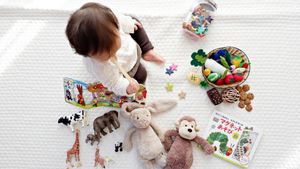JAKARTA - Playing pretending or playing title has always been a favorite game for children. Naturally, children really like this game. Almost all children do it according to their respective imaginations and abilities.
Even research shows that when children have fun creating fantasy worlds and playing stories, they also develop skills in various fields. Children who play more often pretend to have stronger skills in a number of important areas, such as:
Adapted from the Child Mind Institute, Friday, October 25, the play title is open, which means there is no limit to stories or the world that children can create. They can also think creatively about how to use objects for new purposes or use the magic of their imagination, such as putting an invisible crown on friends to make it king. This type of game can support the development of skills in creative thinking and problem solving.
While playing pretending, children have the opportunity to explore emotions in a unique way. They may practice calming the baby doll crying or playing angry monsters. Children who are more involved in this kind of game have stronger emotional knowledge and emotional control and control. Playing roles can help them develop this skill. By expressing emotions differently than they feel to stay in line with the character or situation of the game.
Play settings with siblings and other children provide a natural opportunity for children to build social skills, when they choose roles, create a world and storyline together, and resolve emerging conflicts. Pretending to support the development of mind theory, namely the ability to recognize that other people have different beliefs, intentions, thoughts, and feelings.
In pretending games, children actively use their executive function skills in understanding and maintaining boundaries between imagination and reality. Children who play pretend to have stronger skills in areas such as short-term memory and flexible thinking, and they are better able to maintain their efforts to achieve their goals.
SEE ALSO:
Play screen supports the development of children's language. Children whose games involve a story and complicated imaginary world have vocabulary and skills in retelling more advanced stories.
The pretending game is a way for children to work on important development areas, while also building special skills. Which has the potential to provide social, emotional, academic, and so on long-term benefits.
By playing pretending, children learn to beat fear, explore talent, or develop dreams and ideals. When doing this game, children will at the same time develop initiatives and not just give passive responses. Children will also be more trained to respond to things honestly and as they are.
The English, Chinese, Japanese, Arabic, and French versions are automatically generated by the AI. So there may still be inaccuracies in translating, please always see Indonesian as our main language. (system supported by DigitalSiber.id)


















